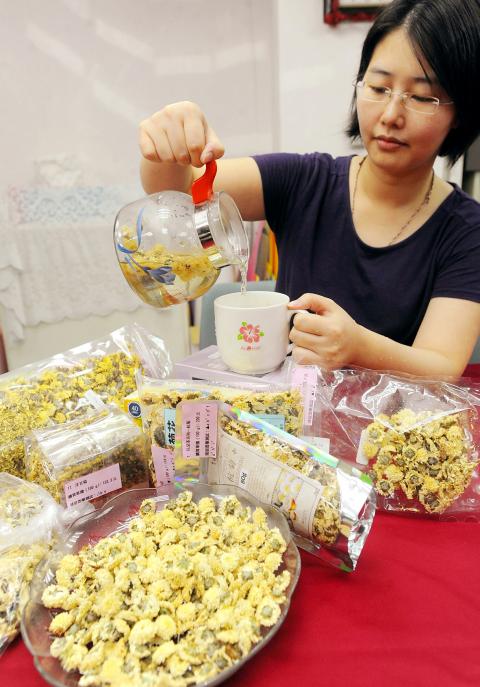Safety examinations on 20 kinds of herbal teas showed that nine kinds of chrysanthemum drinks contained pesticide residue, with eight of them exceeding regulated safety limits, the Consumers’ Foundation said yesterday, urging consumers not to drink the first infusion of tea.
The foundation purchased 20 kinds of herbal teas, including nine chrysanthemum teas, three rose teas, three lavender teas, two chamomile teas and three herb teas with dried berries, from various stores in Taipei City and New Taipei City (新北市) and had them tested for heavy metal, sulfur dioxide and pesticide residues in July.
Although the tests found levels of sulfur dioxide and heavy metal substances — such as cadmium and lead — in the 20 kinds of herbal tea were untraceable or within regulated safety limits, half of the herbal teas did contain pesticide residues.

Photo: Wang Yi-sung, Taipei Times
“Ten teas were found to contain pesticide residues and the majority [nine kinds] of those teas were chrysanthemum tea,” the foundation’s vice chairman Mark Chang (張智剛) said, adding that “several kinds of pesticides were found, with some chrysanthemum teas containing up to six or seven kinds of pesticides.”
A total of 18 kinds of pesticide residues were found, including carbendazim, dimethomorph and imidacloprid, which are often used on food products, the foundation said, adding that difenoconazole and flusiconazole, which are prohibited on spice and other herbal plants, were also found.
A mix of pesticides is commonly found in tests, but the mixture of different pesticides in the human body may cause a “cocktail effect,” meaning that substances become more difficult to eliminate from the body when they are mixed together, the foundation said, adding that some of the combinations of pesticides are even carcinogenic.
Local governmental health divisions should come up with a better method of monitoring pesticide use and the government should establish product certification and traceability mechanisms to ensure food safety, Chang said.
The foundation also urged consumers to avoid herb teas with unclear product labels and to pour away the first infusion of brewed tea to reduce the intake of pesticide residues.
“No matter if you brew the tea with hot water or cold water, pour away the first infusion,” National Taiwan University professor of horticulture and Consumers’ Foundation committee member Cheng Cheng-yung (鄭正勇) said. “If it contains pesticide, the first infusion will contain most of it.”

Taiwanese can file complaints with the Tourism Administration to report travel agencies if their activities caused termination of a person’s citizenship, Mainland Affairs Council Minister Chiu Chui-cheng (邱垂正) said yesterday, after a podcaster highlighted a case in which a person’s citizenship was canceled for receiving a single-use Chinese passport to enter Russia. The council is aware of incidents in which people who signed up through Chinese travel agencies for tours of Russia were told they could obtain Russian visas and fast-track border clearance, Chiu told reporters on the sidelines of an event in Taipei. However, the travel agencies actually applied

Japanese footwear brand Onitsuka Tiger today issued a public apology and said it has suspended an employee amid allegations that the staff member discriminated against a Vietnamese customer at its Taipei 101 store. Posting on the social media platform Threads yesterday, a user said that an employee at the store said that “those shoes are very expensive” when her friend, who is a migrant worker from Vietnam, asked for assistance. The employee then ignored her until she asked again, to which she replied: "We don't have a size 37." The post had amassed nearly 26,000 likes and 916 comments as of this

New measures aimed at making Taiwan more attractive to foreign professionals came into effect this month, the National Development Council said yesterday. Among the changes, international students at Taiwanese universities would be able to work in Taiwan without a work permit in the two years after they graduate, explainer materials provided by the council said. In addition, foreign nationals who graduated from one of the world’s top 200 universities within the past five years can also apply for a two-year open work permit. Previously, those graduates would have needed to apply for a work permit using point-based criteria or have a Taiwanese company

The Shilin District Prosecutors’ Office yesterday indicted two Taiwanese and issued a wanted notice for Pete Liu (劉作虎), founder of Shenzhen-based smartphone manufacturer OnePlus Technology Co (萬普拉斯科技), for allegedly contravening the Act Governing Relations Between the People of the Taiwan Area and the Mainland Area (臺灣地區與大陸地區人民關係條例) by poaching 70 engineers in Taiwan. Liu allegedly traveled to Taiwan at the end of 2014 and met with a Taiwanese man surnamed Lin (林) to discuss establishing a mobile software research and development (R&D) team in Taiwan, prosecutors said. Without approval from the government, Lin, following Liu’s instructions, recruited more than 70 software